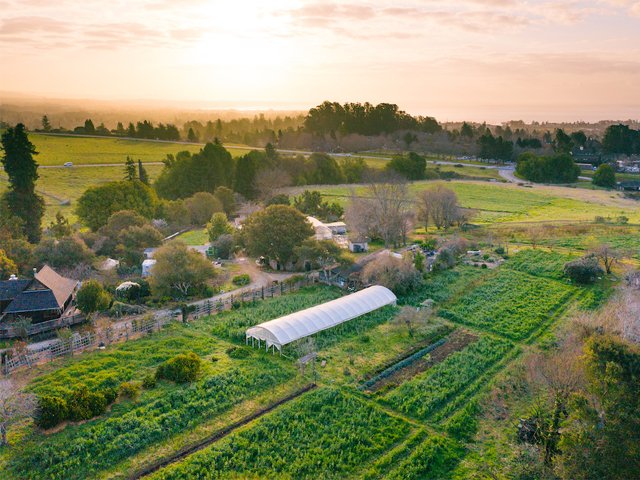4 Climate Resilience Projects Funded by 2022 CITRIS Campus Seed Funding Awards
Aeriel view of a section of UCSC’s farm.
Article by Emily Cerf
To provide pathways forward for addressing challenges of the ongoing global climate crisis, four winning projects have been funded through the The Center for Information Technology Research in the Interest of Society (CITRIS) and the Banatao Institute at UC Santa Cruz’s Campus Seed Funding program. Principal investigators on these projects will pursue multidisciplinary research related to this year’s theme of climate resilience.
Researchers were tasked with designing solutions to significant social challenges related to climate resilience through new or existing technology. Grants of up to $40,000 will fund research on green hydrogen, robotic ecological monitoring, self-driving electric tractors, and a no-waste home water system.
“This year again we had an extremely strong list of applicants and the committee's decisions were not easy,” said CITRIS UCSC Campus Director J.J. Garcia-Luna-Aceves, distinguished professor and chair of the computer science and engineering department at the Baskin School of Engineering. “We feel the four projects we're able to fund this year show great promise in exploring some extremely creative and diverse approaches to increasing our resilience to climate change.”
Generating green hydrogen with seawater
Nobuhiko Kobayashi, professor of electrical and computer engineering, will lead a project to advance his innovative method for generating hydrogen from seawater as a form of renewable energy. Kobayashi and his team will transform their electrolysis technique for generating calcium carbonate from seawater, originally designed for coral reef restoration, into a process to create green hydrogen – hydrogen that is economically and environmentally sound. This technique holds promise for storing the electrical energy produced by other renewable energy sources such as wind or solar, as well as being a form of renewable energy itself. Donald Potts, professor of ecology and evolutionary biology, and Yu Zhang, assistant professor of electrical and computer engineering, will be co-principal investigators on the project.
Ecological monitoring with robotics
As the changing climate affects plants worldwide, understanding how to conserve ecological resources and adjusting agricultural practices to adapt to shifting climate conditions is imperative. Professor of Electrical and Computer Engineering Steve McGuire will develop a system that uses aerial robots, ground vehicles, and expert human operators to automate the identification and remediation of plant disease and environmental stress in wild and agricultural settings. The team will use data collected from novel robotics to create predictive models that can help proactively mitigate negative environmental impacts on plant life. Professor of Environmental Studies Greg Gilbert will be a co-principal investigator on the project.

